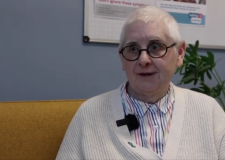Brighton and Hove’s adult carers face £10m challenge
Social work bosses are being asked to spend about £10 million a year less on caring for some of the most vulnerable adults in Brighton and Hove.
The situation is so serious that Brighton and Hove City Council has been looking at how care is provided and whether radical changes need to be made.
One possibility considered could even involve privatising adult social services – a move that has happened elsewhere.
A cross-party trio of councillors have held a couple of workshops to try to get to grips with the scale of the problem.
The £10 million savings are expected to be made from a budget of £105 million, which includes £17 million spent on providing residential care.
A senior official said that the challenge involved a number of initiatives to obtain the best value for every pound spent. Much of that money was spent with private providers.
Whatever way forward is recommended, it may well men doing things differently.
The three councillors will be expected to agree a way forward. Their recommendations will be discussed by the council’s Policy and Resources Committee on Thursday 5 December.
The hard task started on Tuesday 17 September on the same day that a council scrutiny panel looked at the way children with autism were catered for locally.
The three councillors – former Green council leader Bill Randall, former opposition Labour group leader Gill Mitchell and Conservative Andrew Wealls – met in private.
They were joined by staff and union representatives as well as financial and legal experts.
The politicians were given an overview of the services currently provided in-house – that is, by the council.
Many old people in care homes and many adults with disabilities are already looked after by people working for private sector organisations.
The collapse two years ago of Southern Cross, one of Britain’s biggest operators of residential homes, put the sector in the spotlight.
The three councillors were also told what the forecasts are for demand over the next few years.
And they were given an update on the financial pressures – that is, the level of savings that the council predicts that it will have to make.
Their job is to evaluate different ways of doing things, weighing up the pros and cons. The options included
- Retaining current in-house services – keeping the status quo
- Retaining in-house services but redesigning them – known as the “status quo plus” model
- Merging services with an NHS provider
- Handing services to a social enterprise such as a staff mutual or community interest company
- Setting up a local authority trading company to run services
- Outsourcing services through a procurement or tender process – effectively privatising them
At a second meeting on Thursday (26 September) the three councillors were asked to decide which service models – which ways of doing things – they wanted to examine in more detail.
They looked at
- Quality – including quality monitoring and control
- Accessibility
- Sustainability
- Staff support
- Union views
- Flexibility
- Financial considerations
- Public confidence and service user satisfaction
- Staff terms and conditions
- Capacity for innovation and flexibility
Discussions will also be taking place in the adult social care department.
The prospect of radical change will almost certainly prove unsettling for at least some staff – and undoubtedly for those who rely on council-provided care.
While they may like the Green-led council’s preference for services to be provided in-house, the funding pressures are outside the Green Party’s control.
Councillor Wealls has tried to encourage his political rivals to look at the way that councils such as Barnet in London have overhauled the way that they work.
Barnet privatised or commercialised its adult social services through a local authority trading company.
The company is owned by the council but critics say that it is less democratically accountable. They also say that it has budgeted to make a profit from caring for the vulnerable.
To achieve millions of pounds of profit it has to win new business, perhaps from other councils, provide new or better services, charge vulnerable adults higher fees or improve efficiency and productivity. The latter could include cutting pay.
Given the political leanings of the three councillors – two on the left – few would expect social workers in Brighton and Hove to find their jobs privatised in the immediate future.
Yet Councillor Randall and his Conservative predecessor as council leader, Mary Mears, set up a standalone company called Seaside Homes to renovate rundown council housing.
Structures can change, not least when money is tight.




















